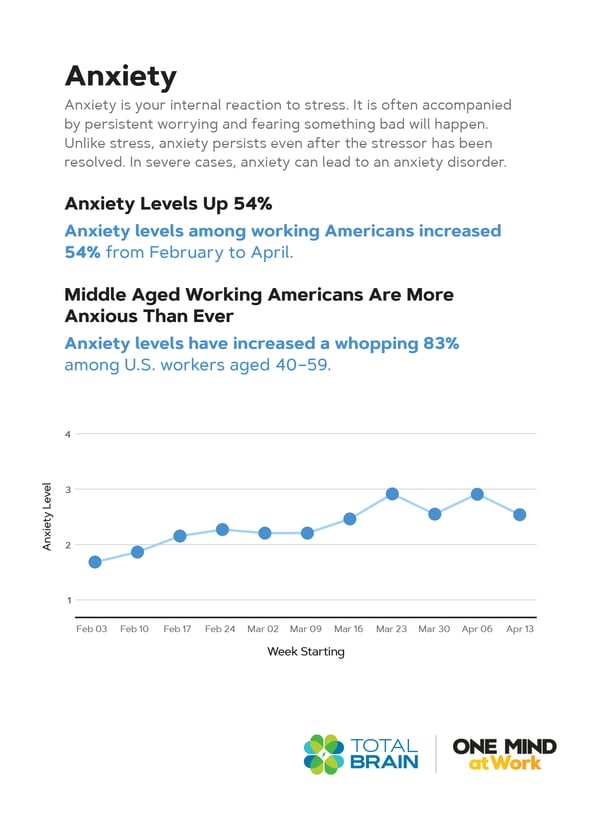By Matt Resteghini on Mon, Jun 1, 2020
Life has changed a lot during the past few months. The COVID-19 pandemic is impacting all of us in one way or another. The data revealed in our Mental Health Index: U.S. Workers Edition bears that out.
The data shows anxiety has risen significantly alongside the rise in the number of COVID-19 cases. In fact, working Americans are 54 percent more anxious now than they were pre-COVID-19. That number is even higher for adults between the ages of 40 and 59 — anxiety increased 83 percent across that group. Additionally, the overall number of people screening positive for a general anxiety disorder has doubled since February.

Here’s a news segment that features our very own Dr. Evian Gordon discussing how our brains are being hijacked by COVID-19 fears. Watch it here (13 minutes).
As we all try to adapt and make the best of difficult circumstances, the reality is that many of us are facing new challenges that are beyond our control. And that can cause a range of feelings from fear and uncertainty to anxiety and a depressed mood. Recognizing these feelings and the emotions behind them is important, and so is finding healthy ways to deal with them. We have a variety of resources to help you cope during this difficult time — including the new Relieve Anxiety Journey.
Our Total Brain Journeys are collections of concrete tools and science-backed brain training activities that together improve how the brain functions in key areas. Total Brian users take personal assessments every 30 days to track their mental well-being and are given recommendations on which journeys to follow based on those assessment results. In addition to the Relieve Anxiety Journey, we have journeys designed to reduce stress, sharpen focus, improve memory, increase resilience and increase positivity. By introducing the new Relieve Anxiety Journey, we hope to help empower more people to stay mentally healthy during the COVID-19 pandemic and into the future.
Beyond the Relieve Anxiety Journey, Total Brain has a number of other resources available to make it easier to cope with anxiety. If you, your family and friends, or your employees are experiencing anxiety, or you want to know more about the science behind anxiety, here are four resources that will help:
- Read Mental Health Update: Fear and Uncertainty in the Age of COVID-19: From sickness and death, to sheltering in place, to a sharp rise in unemployment, the enormous negative effects of COVID-19 are evident across the U.S. Not surprisingly, all of this is a shock to the mental and emotional health of working Americans. Stress, negativity, depressive mood, and even addiction have risen along with anxiety. This report shares a look at the data behind current mental health trends, the possible contributing factors, and the potential outcomes that could result if those factors are left unaddressed.
- Watch Anxiety Overview with Dr. Evian Gordon: Feelings are triggered by emotions, and emotions are triggered by cues of threat or reward. We are currently living through a unique period and, as a result, our brains are detecting many new threats that can’t be immediately resolved. Unfortunately, this means we are stuck in a state of heightened threat response. For now, it appears that we may be dealing with COVID-19 and the effects of the pandemic for months or even years. Strategies such as slow, deep breathing can be useful for managing the automatic response that happens when our brain detects a threat. Slow, deep breathing is one component of Total Brain’s Relieve Anxiety Journey. Here’s an explanation of the journey and why it works:
- Listen to the Reframing Anxiety podcast: Do you realize that shifting your focus to something that uses your right brain — such as listening to music or reading — helps clear away negativity and fend off anxiety? When you participate in a creative activity, your brain’s resources are absorbed by that activity and you are distracted from analytical left brain thinking and processing. In short, creative outlets help prevent you from a deep spiral of analytical thinking about the negatives of a current situation — such as the worries and fears you have about COVID-19, your health, your job, and more. Intentionally focusing on activities that engage your right brain is a key takeaway of this podcast. Tune in for a deeper explanation of how changes such as breaking the cycle of catastrophizing, spending more time focusing on positives, and engaging in creative outlets works to restore calm and manage anxiety.
- Learn how breathing can help: Controlled breathing at the rate of six breaths or less per minute for several minutes is a proven way to reduce stress and anxiety. This type of slow, deep breathing allows you to control your body’s automatic response to threats and fear. When you practice slow, deep breathing, you activate the parasympathetic nervous system. This is the system that controls feelings of calm and safety. Businesses are learning that they can support employees and improve focus and productivity by encouraging individuals to practice slow, deep breathing to control stress and anxiety. This checklist helps businesses identify stress and anxiety triggers employees may be dealing with as a result of COVID-19 that can be managed with controlled breathing exercises: Managing Through Pandemic: How to Improve Employees’ Mental Focus and Workplace Performance.
COVID-19 can feel overwhelming. Having the right tools to deal with the added stress and anxiety can make a big difference in terms of mental health. Check out the resources above, and share them with family, friends, and co-workers. Also, get to know more about Total Brain and what we offer companies by signing up a free 3-month corporate subscription today.




comments